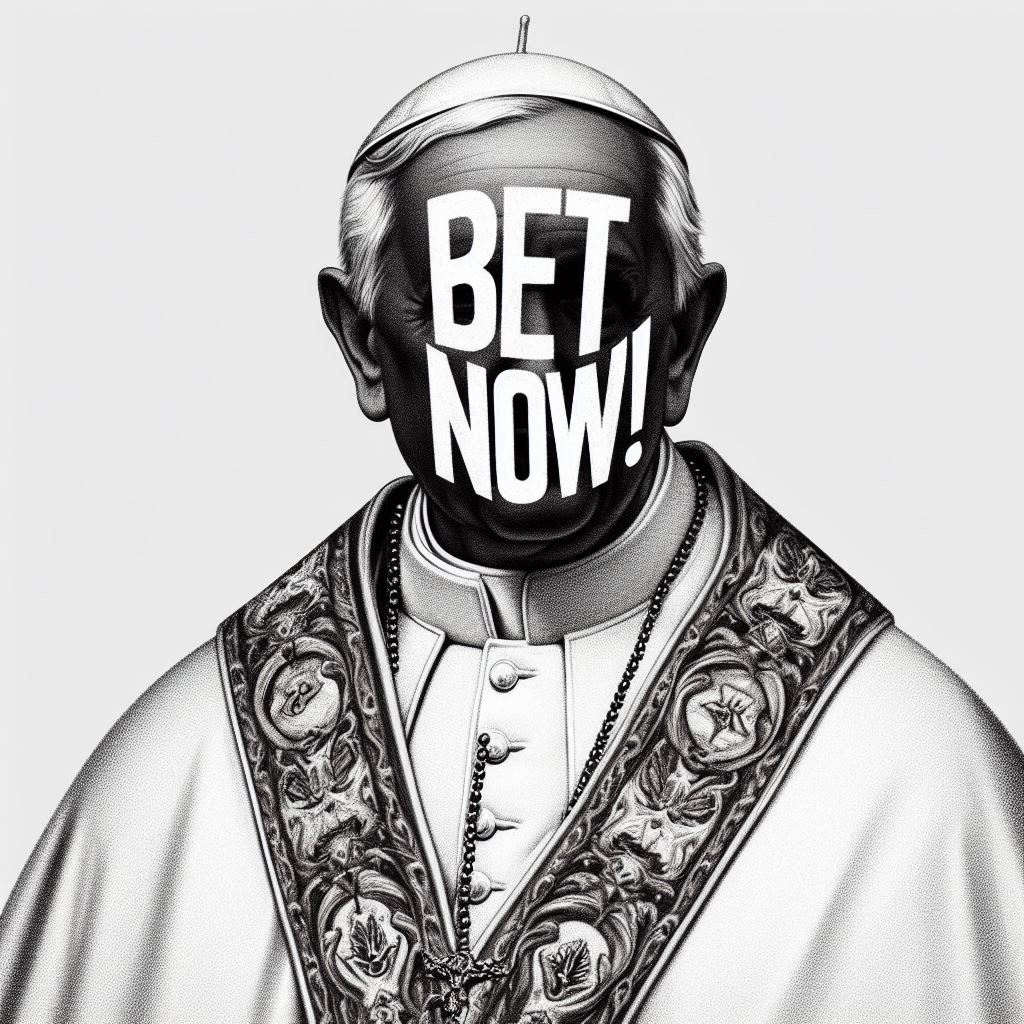Betting on next Pope explodes before Francis is even cold

Although recently deceased pope Francis hasn’t even been buried yet, betting on the next pope is in full swing – but not everybody approves.
Sure, the bible cautions against betting money on games of chance – even though it never uses the term “gambling” – but as we know, Christianity only goes so far. Also, it doesn’t mention online casinos, so times change, I guess.
Top Casinos with Betting Markets
Pope Francis, who delivered his final Easter blessing on April 20, 2025, died in the early hours of the following morning at age 88—just hours after that solemn liturgy in St. Peter’s Square.
His unexpected passing on Easter Monday sent ripples through the Catholic world. It also shook the online prediction markets, where bettors had long been wagering on his health and eventual successor.
Polymarket’s “New Pope in 2025” Market and $1 Million in Losing Wagers
On Polymarket — a blockchain‑based prediction platform — users could bet on the proposition “A new pope will be chosen in 2025.”
Before Francis’ death, more than $1 million had been wagered on the negative side of that question. With the pontiff’s passing, all those bets automatically went to zero, crystallizing significant losses for those expecting him to live through the year.
$2.7 Million Betting on next Pope within 36 Hours
In the roughly 36 hours following the announcement of Francis’ death, Polymarket logged over $2.7 million in bets on who would emerge from the conclave — a volume that ranks among its largest single‑event markets to date.
Favorite Contenders and Market Odds
As of April 21, the top contenders on Polymarket carry these implied probabilities:
- Cardinal Pietro Parolin (Italy) – 36.5%
- Cardinal Luis Antonio Tagle (Philippines) – 26.15%
- Pierbattista Pizzaballa (Vatican) – 9.5%
- Cardinal Péter Erdő (Hungary) – 7.55%
Other names in the running (e.g., Peter Turkson, Robert Sarah, Matteo Zuppi) each account for smaller slices of the market pie, but if names were more than a transient shadow, Pierbattista Pizzaballa should win by a mile.
The Unpredictable Electorate: 130+ Cardinals and a 15th‑Place Surprise
More than 130 cardinals (the exact number fluctuates as vacancies and age limits apply) will enter the Sistine Chapel for the conclave, any of whom could don the white cassock.
History reminds us of the unpredictability of this process: in 2013, Jorge Bergoglio (Pope Francis) was ranked only 15th in the betting markets before being elected.
Online Casinos with Betting and Sportsbooks
Legal Landscape: U.S. Ban vs. European Acceptance
Betting on papal succession remains illegal in the United States, falling under the Federal Wire Act of 1961, which prohibits interstate wagering on non‑sports events.
By contrast, many European bookmakers and betting exchanges — including Paddy Power and various U.K. odds platforms — openly list markets on the next pope, reflecting a more permissive regulatory environment abroad.
From Excommunication to Abrogation: A 400‑Year Canon Law History
The Church itself once sought to stamp out this practice. In 1591, Pope Gregory XIV issued a papal bull threatening excommunication for anyone wagering on the outcome of a papal election.
Surely, that was in accordance with the Holy Book, but even more impressive is the notion that people were already betting on the next pope in the 16th century!
That prohibition remained on the books until it was abrogated in 1918 alongside other decretal laws under the early 20th‑century codification of canon law.
Sacred Mystery or Profane Speculation? Moral Questions
Even as bettors chase odds, many question the ethics of profiting from a process meant to discern divine will.
Pope Francis himself warned against the “dogma of neoliberal faith” and criticized financial speculation that “fundamentally aimed at quick profit”.
Is it disrespectful to reduce a sacred conclave to a market commodity? Or simply the modern world’s inevitable intersection of faith and finance?
As the College of Cardinals laments, chooses, and celebrates, this question will echo. Even long after white smoke rises from the Sistine Chapel chimney. You bet it will.
You might also be interested
You must be logged in to post a comment.





